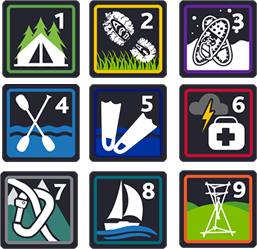The Canadian Path: A Unified Scouting Experience
A unified Scouting experience that's youth-led, adventure-driven, and designed for growth
✅ Four Key Elements – The foundation of the program:
🔹 Youth-led – Scouts take charge of their own adventures and leadership opportunities.
🔹 Plan-Do-Review – A cycle that encourages learning, reflection, and growth.
🔹 Adventure – Challenging experiences that develop resilience and confidence.
🔹 SPICES – Personal development through Social, Physical, Intellectual, Character, Emotional, and Spiritual growth.
✅ Six Program Areas – Themes that guide Scouting adventures and help youth explore new skills and interests.
✅ Outdoor Adventure Skills (OAS) – A progressive skills program that follows youth from Beavers to Rovers, focusing on camping, survival, paddling, first aid, and more!
By following The Canadian Path, Scouts develop independence, leadership, and confidence, preparing them for lifelong success while embracing the spirit of adventure.
The Four Elements of the Canadian Path
The Canadian Path is built on four key elements: Youth-Led, Plan-Do-Review, Adventure, and SPICES. These principles empower youth to shape their own Scouting experience, ensuring they develop leadership skills, engage in meaningful adventures, and grow into well-rounded individuals.
🧭 Youth-Led – Scouts Take Charge!
Scouts take charge of their own adventures and leadership opportunities. They decide what activities to pursue, what challenges to tackle, and bring their own ideas to create unique experiences.
Scouting isn’t just following instructions—it’s about taking the lead and building confidence through action!
🔄 Plan-Do-Review – Learning Through Experience
A continuous cycle of learning that encourages growth through experience. Youth plan activities, actively participate, then reflect on what worked, what was challenging, and how to improve.
This cycle builds problem-solving skills and helps youth gain deeper insights from their experiences!
🌟 Adventure – Exploring New Possibilities!
Challenging experiences that develop resilience and confidence. From wilderness exploration to creative projects, every adventure is a chance to grow and discover new possibilities.
Every adventure is a chance to grow, discover, and push beyond comfort zones!
🛤 SPICES – Building Well-Rounded Individuals
Personal development through Social, Physical, Intellectual, Character, Emotional, and Spiritual growth. This framework ensures well-rounded development in all areas of life.
By embracing SPICES, youth become confident, capable, and prepared for life’s challenges!
🚀 The Canadian Path: A Journey of Growth & Adventure!
Through Youth-Led experiences, the Plan-Do-Review cycle, meaningful Adventures, and the SPICES framework, Scouts develop leadership, problem-solving, resilience, and lifelong skills while having FUN!
The Six Program Areas of the Canadian Path
The Canadian Path is divided into six Program Areas, each offering unique opportunities for exploration, growth, and skill development. Youth engage in age-appropriate activities across these areas, making Scouting exciting and meaningful.
🔹 Adventures may span multiple Program Areas, encouraging youth to challenge themselves and develop in all SPICES categories.
🔹 Youth-led programming ensures Scouts decide their own adventures, making each experience personal and rewarding.
🌿 Environment & Outdoors – Explore & Respect Nature
Scouts immerse themselves in hiking, camping, paddling, and outdoor survival while learning to protect and appreciate the environment.
✔ Nature interaction – Discover ecosystems and wildlife.
✔ Outdoor living – Master camping, navigation, and survival skills.
✔ Environmental stewardship – Adopt Leave No Trace principles.
🏆 Leadership – Develop Confidence & Inspire Others
Scouts practice leadership skills, guiding small groups, mentoring others, and making impactful decisions in their Section and community.
✔ Team leadership – Lead patrols and collaborative projects.
✔ Mentorship – Support younger Scouts through shared experiences.
✔ Decision-making – Learn how to lead and follow effectively.
💪 Active & Healthy Living – Build Strength & Wellbeing
This area encourages fitness, wellbeing, and smart decision-making for happy and healthy living.
✔ Physical activity – Try new sports and movement-based challenges.
✔ Health education – Learn nutrition, fitness, and self-care.
✔ First aid training – Master emergency preparedness skills.
🌍 Citizenship – Serve & Connect with the World
Scouts discover their role as responsible citizens, learning about Canada, global communities, democracy, and service projects.
✔ Community engagement – Give back through service projects.
✔ Civic knowledge – Explore Canada’s history, legal system, and democracy.
✔ Global connections – Participate in jamborees and international Scouting initiatives.
🎭 Creative Expression – Imagine, Create & Inspire
Scouts explore their unique talents, experimenting with art, music, drama, digital storytelling, and problem-solving.
✔ Express creativity – Develop skills in visual, musical, and performance arts.
✔ Team collaboration – Use imagination to solve challenges.
✔ Personal growth – Build confidence through artistic exploration.
🛤 Beliefs & Values – Reflect & Respect Diversity
Scouts explore personal values, cultural traditions, and spiritual beliefs, helping them develop respect, gratitude, and a strong moral compass.
✔ Self-reflection – Understand personal beliefs and values.
✔ Cultural awareness – Appreciate diverse traditions and faiths.
✔ Duty to others – Foster gratitude, service, and personal integrity.
🗺 Section-Specific Scouting Maps
Beavers, Cubs and Scouts explore Program Areas through a unique thematic map:
🔹 Beaver Scouts – The Pond, guided by Friends of the Forest.
🔹 Cub Scouts – The Jungle, supported by the wolf pack.
🔹 Scouts – Trails across Canada, discovering new paths.
Venturers and Rovers explore Program Areas through a unique Symbolic Framework:
🔹 Venturer Scouts – Climbing a mountain, striving for the summit.
🔹 Rover Scouts – Paddling their own canoe, navigating their own journey.
With these tools, youth chart their own adventures, making Scouting experiences engaging, enriching, and unforgettable!
Outdoor Adventure Skills: Building Confidence & Exploring the Outdoors!
The Outdoor Adventure Skills (OAS) program encourages Scouts to try new challenges, develop real-world skills, and gain confidence in the outdoors while ensuring safe, progressive learning.
✅ Divided into 9 skill pathways, each with 9 progressive stages.
✅ Badges awarded for each stage, but the focus is on experience, skill-building, and adventure.
✅ Supports the Plan-Do-Review process, helping youth reflect, adapt, and improve.
🌲 The 9 Outdoor Adventure Skills Pathways
Scouts explore a variety of outdoor experiences, expanding their abilities across:
🔹 Camping Skills – Set up shelters, cook outdoors, and master survival techniques.
🔹 Trail Skills – Navigate terrain, practice hiking safety, and explore nature.
🔹 Winter Skills – Learn cold-weather survival, snow shelters, and winter sports.
🔹 Paddling Skills – Master canoeing, kayaking, and water safety.
🔹 Aquatic Skills – Snorkeling, water rescues, and safe water practices.
🔹 Emergency Aid – First aid, crisis response, and lifesaving techniques.
🔹 Vertical Skills – Climbing, rappelling, and safe rope work.
🔹 Sailing Skills – Understanding wind, navigation, and boat handling.
🔹 Scoutcraft – Traditional Scouting skills, including knots, mapping, and fire-building.
Each skill area helps Scouts gain independence, build resilience, and embrace outdoor challenges!
📈 How OAS Progression Works
✔ Stages are NOT tied to any Section, meaning all youth start at Stage 1, regardless of age or Scouting experience.
✔ Competencies define each stage, with statements like:
🏕️ "I know how to pitch a tent."
🥾 "I can plan a week-long hiking trip."
✔ Assessments are flexible—Scouters, mentors, instructors, or experienced peers (2 stages ahead) can evaluate skill development.
✔ Outside learning counts! If a youth has developed skills beyond Scouting, they can still be assessed and progress appropriately.
🛡️ Risk Management: Ensuring Safe Adventures
OAS does NOT act as a certification—Scouts should never be excluded from an adventure based solely on their stage.
💡 Instead, risk assessment determines participation:
✅ Right Place – Is this environment suitable for all participants?
✅ Right Time – Are conditions safe for this skill level?
✅ Right People – Are trained leaders or mentors available to guide the activity?
✅ Right Equipment – Does everyone have appropriate gear and preparation?
By prioritizing safety and readiness, Scouts embrace adventure while building experience at their own pace!
🚀 Outdoor Adventure Skills: Preparing Scouts for Life!
The OAS program encourages leadership, resilience, teamwork, and outdoor expertise, helping Scouts grow through exciting new challenges.
